Ira Wagler on Growing Up Amish: 6-book giveaway
Today, an interview with Ira Wagler on his new memoir, Growing Up Amish.
 Ira was born in the Aylmer, Ontario Amish community and grew up in Bloomfield, Iowa.
Ira was born in the Aylmer, Ontario Amish community and grew up in Bloomfield, Iowa.
During his youth and young adulthood he spent time on a Nebraska cattle ranch, Canadian wheat fields, and in Amish communities across the country.
Ira struggled with life as an Amish person before finally leaving for good in his mid-20s. Ira is a friend of mine and has a true gift for writing; the book is a page-turner.
We’ve also got a 6-book giveaway courtesy of the good folks at Ira’s publisher, Tyndale.
Growing up Amish 6-book giveaway
There are three ways to enter the Growing Up Amish giveaway contest:
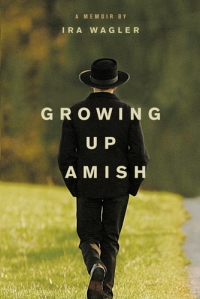 1) leave a comment on this post=1 chance to win
1) leave a comment on this post=1 chance to win
2) share this contest on Facebook=2 chances to win
3) mention this contest on your blog=3 chances to win
So do all three, and you’ll have 6 chances to win Ira’s book. If you share on Facebook or your blog, drop me a quick email at amishamerica(at)gmail.com letting know you did.
The contest runs for one week. One stipulation: books can only be shipped to US or Canadian addresses.
The six winners will be chosen at random and announced here next Thursday, July 21.
Ira Wagler interview
Amish America: You’re quite blunt in telling your story, both about yourself, and those around you—family, community, church leaders (i.e., the “mad Bishop of Ligonier”, who, unlike most in the book, remains anonymous). How have people responded?
Ira Wagler: Mostly, the response has been from my siblings, so far. And it’s been amazingly supportive. A bit of friction from one or two, but nothing that will estrange us, I think. All of them spoke of the searing trauma of going back and “reliving” those days with me. Of course, they were all on the sidelines, but they were there. Overall, I’ve been surprised and humbled by their reactions.
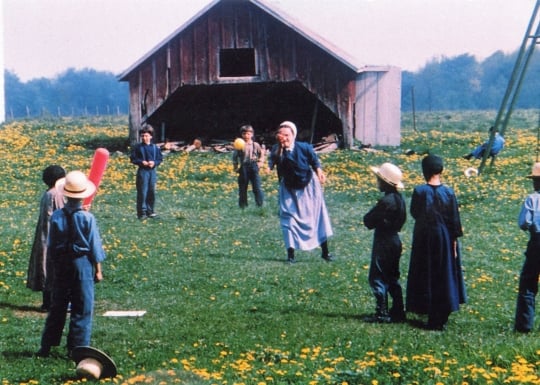
You’ve spent time everywhere from your birth community of Aylmer to Bloomfield where you grew up, to Pinecraft in Florida to Indiana. Now you live in Lancaster County. How did you end up there? And how is life in Lancaster compared to those other places?
Ira Wagler: Yeah, it is a bit strange. Somehow, even after leaving, I found myself lurking around the perimeters of a large Amish community like Lancaster. I first came in the spring of 1989, after a friend invited me out to work construction during the summer months. That was the year I started college. After that, I returned every summer and grew to love the place. I have considered Lancaster County my home since the early 1990s.
Lancaster has the gamut of them all, from the sternest hard core Amish to some of the most enlightened people I know. Some of my closest friends here are Old Order Amish. I stop by weekly at a couple of Amish homes, just to hang out drinking coffee, and to beg bread and food from the goodwife. It’s a beautiful thing, especially for a guy living alone who can’t cook or bake.
Growing Up Amish seems as much about your relationship with your family as it is about your struggle with being Amish. At one point in the book, you are excommunicated after leaving. What is your status now, and how are things with your family?
Ira Wagler: Today, I am not excommunicated from the Amish church, which would be unfathomable here in Lancaster County. But I left the Amish church in the very progressive area of Goshen, IN, where they are much more enlightened about such things.
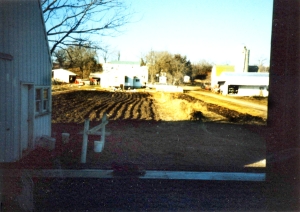
I am close to all my siblings. Closer to some than others, of course. But when we get together, we are all genuinely glad to see each other and to hang out with each other. I can’t be thankful enough for that.
There was a time, not that long ago, when our current relationships with each other would have been impossible. But with the passing of time, as we all got older, we’ve recognized the important things in life. And that includes us, me and my siblings, accepting each other, despite our differences in lifestyles.
And what does your family think of your writing? Since your father David is one of the originals at Family Life, it seems the apple doesn’t fall far from the tree?
Ira Wagler: Yeah, I am my father’s son in that respect, for sure. My family always knew I “had it.” Had what it takes. But none probably expected me to actually make it to publication. They are all proud that at least one son followed in his father’s footsteps, if not in lifestyle, at least in writing.
In a pivotal section of your story, you describe your relationship with your girlfriend and eventual fiancee Sarah Miller. One gets the impression that an Amish first date has greater implications that an English one. By how you describe it, it almost seems asking for a first date is a pre-proposal.
But certainly not all Amish marry the first person they date? And how often do relationships end the way yours did?
Ira Wagler: Well, that varies a lot from community to community. In Bloomfield, where I lived at the time, a first date was of course not equated with marriage. But casual dating was also frowned upon, and not done much. So once a couple had that first date, that meant that the chances of them getting married were certainly greater than not getting married.
Some dating relationships fell through, here and there. That’s inevitable, in the normal course of life. But to proceed to the point we did, where we were engaged, then have that break off, that’s a bit rare in any Amish setting. Not unheard of, by any means. But rare.
Your buddies, the “gang of six”, figure prominently in the book. What is social life like for an Amish youth? And what’s become of the gang today?
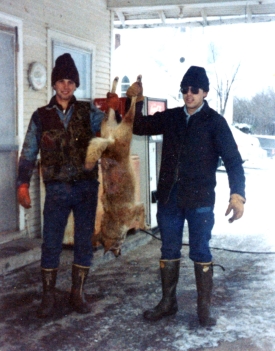
Ira Wagler: Again, social life varies greatly from community to community. In Bloomfield, the “gang of six” forged its own way, as the settlement was so young, and there had been no wild youth before us.
Of the six, only one remains Amish. Mervin is a preacher today in Bloomfield. Of the remaining five, I guess two would retain some semblance of plainness. That leaves three of us who are completely “English.”
Throughout the book you are critical but also appreciative of Amish life. You’re clear, however, that it’s not for you (some of your final words in Growing Up Amish: “I would never dream of returning”).
But in your opinion what are those strong sides of Amish society?
Ira Wagler: I would boil it down to three things, although of course there are many other factors. Family. Faith. And work ethic.
I can’t stress enough the work ethic, because it affects all else. Amish children are taught to work from almost the time they can walk. Little simple chores. And they get more responsibility as they grow. They learn to work hard, earn their bread by the sweat of their brows, and know no other way.
That’s the primary thing society has lost, at least western society. Work. Pull your own weight. Expect nothing you haven’t earned. Help those who can’t work with your free will offerings. It’s a real shame that so much of that has been lost in the outside world.
And weak sides?
Ira Wagler: The stifling legalism so prevalent in some form in all Amish communities. The Amish use the bann and shunning, because absent that, the culture could not survive. It’s a survival mechanism that has emerged and solidified over the course of many generations. I don’t fault them for it, necessarily. It is what it is. But, over time, that survival mechanism has caused a lot of deep pain and trauma for a lot of people.
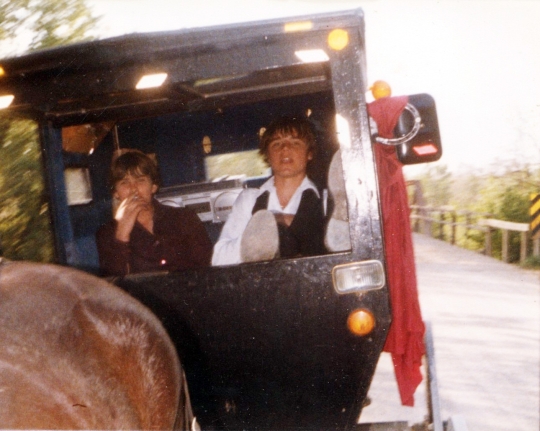
If you had somehow remained Amish, where would you be today?
Ira Wagler: Two possible scenarios. I would have believed in and held on to the Amish way in my heart, and would have risen to a position of influence and leadership (perhaps as my father did, by writing). Or I would have gone insane. Probably the latter, in all honesty.
And why aren’t you driving a horse-and-buggy today?
Ira Wagler: Hmm. Well, that’s a pretty open-ended question. For a detailed answer, I guess you’ll have to read the book.
What do you write about on your blog, and where do we find it?
Ira Wagler: My blog is my release valve. I write about anything and everything that happens to be on my mind. Or going on around me. Right now, I’m posting rather sporadically, what with my book coming out and all. You can always find me at www.irawagler.com
What is your next book going to be about?
Ira Wagler: So far there have been no discussions with anyone about the next book. Whether there is even a second book will depend on the sales of the first. That’s the market. And that’s life. I hope to be published again, of course. What writer wouldn’t? In the meantime, though, I will always post my musings on my blog.
Order Growing Up Amish at Amazon.





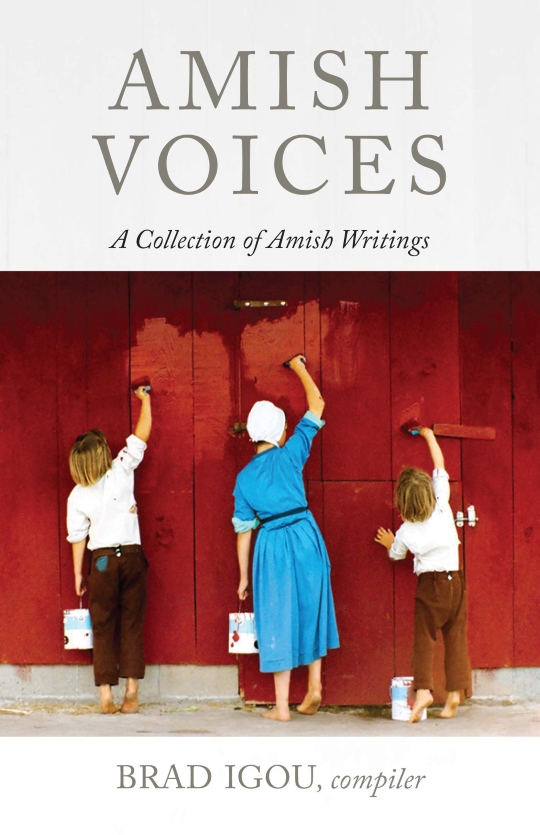
I also have read Ira’s book, it really is a good book,but one person asked him why he wasn’t driving a horse and buggy now and he said you’ll have to read my book to find out…….guess I need to read the book again, as I don’t remember that either…..so hope to win a copy……I noticed some of these comments are from 2011 is this contest still good ?
Also Ira. if you’re reading this, after I read your book, I emailed you on your blog and commented on your book, and I never heard from you !!!! Are you that behind in your responding???That must have been about 6mos. ago…..still haven’t read all of your blog as the writing is so small…..
Enjoyed your book
Hi Ira, I just finished reading your book and found it interesting. Do the Amish people really think they are the only people that will get to heaven? What about the rest of us?
Is it true faith or dead works?
I grew up Amish and finally left it for good 20 years after, being baptized in 1983.I enjoyed your book especially because of some relations to your situation and setting.
My conclusion was that it is a religion upholding works and not faith.Do you claim both for it or only one of them?Or how much respect should we have for a religion that is against the spirit of God.I can respect the people whatever they may believe in.Even if it is a door knob.But I cannot respect the faith if it is not divine.1Jn.2 If I have misunderstood this part of your book or if I am wrong in my understanding please help me out.Thank you.
Similarities with Free Holiness in the South
Dear Ira,
I just finished reading your book, Growing Up Amish, and I was very impressed. My heart was touched by the pain you endured at the hands of those who are supposed to be Christ-like. Many of us have been hurt by “the church” and yet we can’t seem to leave it because it’s so ingrained in us. It’s a part of who we are. Some of us identified with you on so many levels.
If you should ever write another book, I would be glad to buy it and read it. I immediately went to the computer (after I read the book) and googled your name, and it brought me here. It was nice to see actual pictures of you. I wish you nothing but success and peace of mind. To many of us, you are a hero.
Thanks, Don
Hoping to read your book soon
I will look for it in the used book store and library. I am reading so much right now though but wish to learn more about Amish as my new home has Amish nearby. I want to be a good neighbor so I am reading and reading.
I loved your book
I live in the area you describe and have many Amish clients. But my question is about the pictures of your family. I was told (many times) that Amish do not allow their pictures to be taken.
In fact, once I was in Topeka and I wanted to take a picture of a neat little buggy with passengers and they hid their faces and I was admonished by others not to take pictures.
I live in Northern Indiana and your description of Topeka and Goshen were very famililar to me… it was a great read.
I hope you have a wonderful life.
Thanks for your insight.
Thank you for your insight of the Amish community. I am interested in different Christian sects especially Amish. I am always finding fiction books that give me a peek into life in that community. I am reading a book titled “A Wedding Quilt for Ella” I especially like the work ethic in families. It seems to breed a real caring for others on a day to day basis.
interesting... :)
Hi, thank you for this information about some of the things Ira went through in growing up Amish. I do like the simplicity of life that seems to be part of the Amish way of life. It kind of brings me back to my family when i was growing up. We were a large family and our families were farmers but my father was kind of moving away from that way of life (he had his own orchard but no other big farming type life like our relatives had). I loved that life and hanging out with my relatives alot, similar to what I’ve read in some stories of the Amish. Honestly, I like that alot more than the modern life, what I see around me and am not a big city person at all. I live in the country—and that’s just fine, thank you. LOL. I haven’t read Ira’s book but would love to and see if some of the family issues were similar to what I had seen, even though our faiths are different.
sarah miller
What ever happened to Sarah? is she happy now? is she married? does she still live in the same community? Did she marry someone who moved her from family to another community twice like your father did? I worry for Sarah.
Is this a new contest or what ? I noticed I had already commented on 1/7/12 ! But will enter to win a copy of this book, would love to have it and read it again…..like I said I seemed to have missed why you no longer drive a horse and buggy….so need to read it again 🙂 it was a great book tho and I really enjoyed it, think you should write a follow up to it tho…..did you ever get married, etc. ?????
This is a wonderful book . I have it on Kindle ,but would love to have a paperback for my collection. It would be nice to see Ira Ira write a second book ..I know it would sell just like the first..